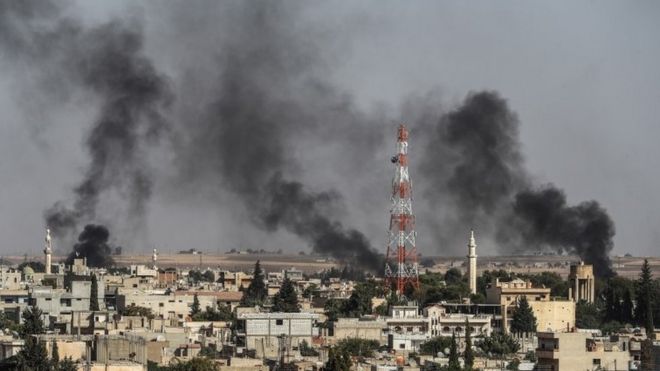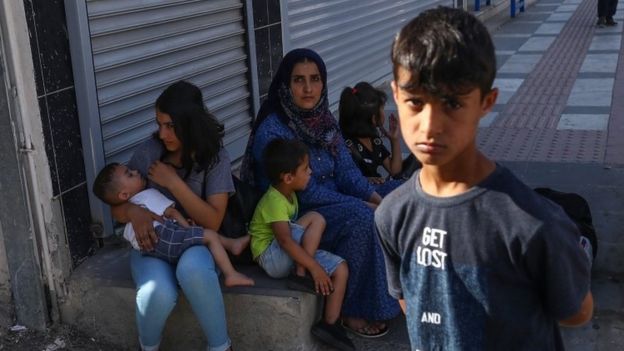Turkey Syria offensive: Your questions answered

Smoke rises from inside Syria during bombardment by Turkish forces Turkish forces have entered Kurdish-held areas of northern Syria.
As smoke billows in border areas and tens of thousands flee their homes, many are wondering what lies ahead. The situation is complex, with a wide range of players holding conflicting interests. We asked you to send us your questions, so we could fill in the gaps and make things a little clearer. Does the threat of ethnic cleansing exist? – Rickey Paul Adams, diplomatic correspondent, replies: Unfortunately yes. North-eastern Syria is ethnically mixed, with Kurds in a majority in some areas, and Sunni Muslim Arabs the majority in others. Add to that a smattering of smaller groups, including some Christians. ‘The Kurds have no friends but the mountains’ The UN estimates that Turkey’s 2018 incursion into the mostly Kurdish Afrin region (further west) displaced 137,000 people. As the latest operation began on Wednesday, thousands of Kurdish civilians began to flee border towns.

Border areas inside Turkey have also come under fire If Turkey’s President Recep Tayyip Erdogan is genuinely determined to settle as many as 2 million Syrian refugees in newly captured territory along the border, this could significantly alter the demography of the region. For his part, Mr Erdogan says the operation aims merely to restore the region’s demographic structure and send Syrians back to their homes. What is the logic behind Trump abandoning the Kurds? – John Paul Adams: It’s logic of the coldest kind. The US-Kurdish alliance was forged over the battle to repel Islamic State (IS). It began at Kobane in late 2014 and continued all the way to the defeat of IS at Baghouz in March this year. It’s never really been about anything else. Donald Trump believes the job has been done (many, including his own military chiefs, disagree) and that the US no longer has any business being in north-east Syria. Media captionTrump: Kurds “didn’t help us in Second World War” More broadly, the Kurds – stateless and spread across Syria, Turkey, Iraq and Iran – have long felt that when it comes to the politics of their host countries, and the machinations of the Great Powers, their interests are inevitably ignored. Why can’t other Nato countries take the place of the US in Syria? – Peter James Robbins, diplomatic correspondent: In theory, they could. They most certainly won’t, because they have neither the strength of purpose nor the necessary military might to enter an arena where the United States itself has already ceded dominance to the other substantial nuclear power, Russia. What did the Kurds ever do for the US? From the very beginnings of the uprising against Syrian President Bashar al-Assad, the United States and its Western allies have been far more willing to offer “moral” support rather than full-on military support to what they regard as legitimate, non-jihadist opposition groups or forces. At least part of that reluctance stemmed from acute Western failure in Afghanistan and in Iraq. Image copyright AFP Image caption Pro-Turkish Syrian fighters gather in northern Aleppo province Russia’s decisive military intervention on President Assad’s side in September 2015 left the United States struggling to try to ensure its forces, on land and particularly in the air, did not end up in a shooting war with Russia. No lesser power would even contemplate taking the positions in Syria the Americans are gradually vacating. Is the US complicit if IS are allowed to regroup? – Wendy Paul Adams: This is what an awful lot of people, including the Kurds and members of Donald Trump’s Republican Party in the US Congress, are saying. Donald Trump says IS is finished. Very few people agree with him. Can this particular battle, against an ideology as well as a movement, ever really be “over”? There’s no easy answer. But there’s no doubt that Donald Trump will face a lot of criticism if IS makes a significant comeback. Why are many European IS fighters not being repatriated and tried in their countries of origin? – Chris Gordon Corera, security correspondent: The simple answer is because the countries have not wanted to take them. The US has been pushing European countries to take them but they have been reluctant. They would need to be put on trial but there is often a lack of evidence that would be admissible in court. The fear is that they might then be released. The result is the problem has been deferred but now facts on the ground may force change. Media captionInside the camp of IS families in Syria Will the West support the Kurds and place sanctions on Turkey if they attack them? – Colin James Robbins: To the first part of your question, I would suggest that some countries in “the West” will support the Kurds in words, but not with much, if any, action. The Kurds are in the tragic position of being an enormous ethnic group without an independent nation state to call their own… With nationhood comes power. Without nationhood, other nations who have already carved up a region, or have had it carved up for them in the past by colonial powers, are extremely unlikely to cede territory to make space for the creation of a new one. Media captionSome residents began to flee as smoke rose over the town of Ras al-Ain To the second part of your question, I would suggest the likelihood of sanctions against Turkey is very small. That could change if overwhelming evidence were to emerge of grave breaches of the laws of war or of humanitarian law by Turkey. If the [Kurdish] YPG [militia] were co-operating (by dismantling fortifications and withdrawing heavy weapons) then why are Turkey launching an offensive? – Martyn Paul Adams: There’s evidence that the Kurdish-led Syrian Democratic Forces (SDF), dominated by the YPG, were already pulling back from some border areas ahead of Wednesday’s launch of Operation Peace Spring. Who are the Kurds? But there was no sign of a wholesale withdrawal, and civilians were being urged to resist the Turkish advance. Reports since Wednesday have been patchy, so it’s hard to know how hard the Kurds are fighting. It’s likely that in some places at least the SDF will have chosen tactical retreat over confrontation with a much more powerful enemy. But Turkey is determined to secure President Erdogan’s buffer zone, which simply can’t be done without a significant, long-term military operation. Is an active resettlement and rehabilitation programme realistically possible? – Rodney Paul Adams: Good question. This seems to be a big part of what President Erdogan is trying to achieve. Having hosted millions of Syrian refugees for so many years, he is understandably anxious to find alternative solutions. But this effort could run into all sorts of problems.
